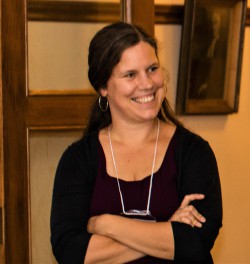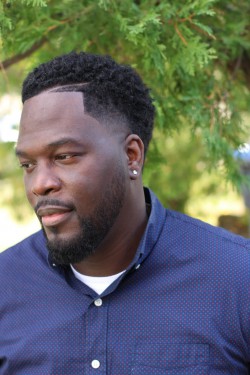U of T Ecumenical Chaplaincy Spotlight
What does a day in the life of a chaplain look like and what drives people to this career choice? We recently asked chaplains at The Ecumenical Chaplaincy at the University of Toronto (ECUT) for their perspective. Learn more about The Ecumenical Chaplaincy at the University of Toronto below.
Jeanette Unger Emm 0T6, Associate Chaplain St. George Campus

EC Connects: How/why/when did you go into chaplaincy?
Jeanette: In 2006 I was just finishing my MTS degree at Emmanuel. I was trying to discern whether I wanted to continue with PhD studies, or move into congregational ministry, when the opportunity for a part-time student chaplain position opened with ECUT. A friend encouraged me to apply to the position and the rest is history! The calling found me at a moment in my life when I was willing to say “yes”. I am so grateful for the amazing people I’ve met and the learning I’ve done as a campus chaplain. I enjoy the energy, the questions, the creativity and the courage that university students bring to their lives and their faith. It’s such an honour to travel along with students!
EC Connects: What does a typical day as a chaplain look like?
Jeanette: I don’t think there is a typical day! On any given day I may meet one-on-one with students for pastoral care. Sometimes these conversations range from grief support to relationship struggles, or to big doubts about coming out or accessing additional mental health or accommodation supports at the university. I always offer to pray with/for the student I meet, so pockets of prayer are scattered throughout my day, which I love. I may be preparing for a program, like a grief support group, or attending worship services at Knox or Emmanuel Colleges. A former colleague, Rev. Ralph Carl Wushke, described chaplaincy work as “loitering with intent,” and I think about that as an invitation to be present in all kinds of events and spaces where I can meet and befriend people. Another big part of my role is administration. It’s not glamorous, but because ECUT is a non-profit charitable organization (we are not university employees), part of my work is to write grants, do basic bookkeeping and payroll, help with fundraising, post on social media and so on. There’s so much behind-the-scenes administrative work that happens to keep our tiny non-profit going!
EC Connects: In difficult/challenging times what spiritual practice/prayer do you lean into?
Jeanette: During the pandemic, I started going for very early morning walks. I end my walks by a beautiful tree in the tiny playground at the end of my street. I stand with one hand on the tree and one hand on my heart, taking deep breaths and then whispering quiet prayers to God. This small act helps to keep me grounded and connected. The tree’s steady presence through all the seasons is a gift to my worried heart. Praying out loud and voicing my concerns, hopes and fears before God reminds me of God’s love and care. I only spend a few minutes here before I need to get home and launch into the busyness of the day, but these minutes are sacred ones for me.
Leonard Clarke Jr (Jae) Emm 1T7, 1T9, Associate Chaplain Scarborough Campus

Leonard: It is a joy to have an opportunity to dedicate one's life to truly understanding the needs of others, genuinely and attentively listening to their concerns, and faithfully helping them navigate any adversity they face. It is in these purpose-filled moments that fundamental change takes place in the life of the individual and the communities in which we live. This, I am convinced, is the trust tenet of ECUT chaplaincy work, and the reason I am an ECUT chaplain.
In general, chaplaincy work is focused on service to the community and effecting positive and impactful changes in the lives of those encountered. More specifically, chaplaincy work is mission-focused. Throughout my time as ECUT chaplain, my mission has been informed by my desire to advocate for the marginalized and the oppressed. I envision my work following the example of Martin Luther King Jr who saw it as his great mandate to lift downtrodden communities from the depths of unimaginable racial despair.
I feel strongly that no individual or community should crater underneath the evilness of hate and oppression. I feel strongly that no individual or community should experience the towering malignancy of inequality and discrimination. I believe deeply that equitable justice for individuals and the community must inform the work we do in service to God. Therefore, I have dedicated the majority of my adult life, and my time as chaplain, to championing equitable justice.
According to Mark 14:7, the work of justice and equality, inclusion and anti-discrimination will always be relevant. Because of this, the Ecumenical Chaplaincy in the University of Toronto will continually solicit your support to advance our work in service to God.
_________________________________________
Are you, or someone you know, called to a career in chaplaincy? Check out Emmanuel College's Master of Pastoral Studies program with Certificate in Spiritual Care and Psychotherapy.
The Ecumenical Chaplaincy at the University of Toronto
The Ecumenical Chaplaincy at the University of Toronto (ECUT)’s vision is to offer friendship and support to the U of T community in the search for learning, meaning, purpose, community and wholeness. ECUT is a Christian voice, rooted in the traditions of The Presbyterian Church in Canada and The United Church of Canada. ECUT chaplains are available to meet confidentially with members of the university community. Those feeling anxious, stressed, or facing a challenge in their life for personal, spiritual, or academic reasons, can reach out to the ECUT chaplains. Whether you have spiritual questions or just need someone to talk to about what life is like for you right now, the chaplains are glad to listen, to pray with you, and to be an empathetic presence. They bring a faith-based Christian perspective to pastoral conversations and can make referrals to other supports as needed. ECUT is involved in the following programs on the St. George campus: a monthly grief support sharing group for students who have experienced a death; Qu(e)erying Religion programs that explore the intersections of gender, faith and sexuality; and ecology and spirituality events that focus on the connections between the environment and faith. ECUT also supports the Student Christian Movement, which is a faith and social justice student club on campus.
